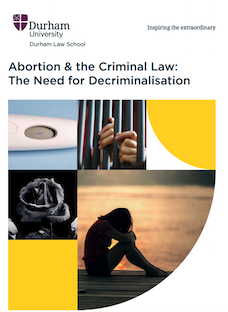Abortion and the Criminal Law: The Need for Decriminalisation
In this briefing, Dr Milne explains why abortion needs to be removed from the criminal law.
 Whilst abortion in Great Britain is accessible, it remains a criminal offence to procure an abortion under section 58 of the Offences Against the Person Act 1861, unless the medical procedure is conducted in line with the requirements stipulated in the Abortion Act 1967. Any woman who ends her own pregnancy is breaking the law and faces up to life imprisonment. Currently, in early 2023, there are two women in Great Britain facing up to life imprisonment for ending their own pregnancies.
Whilst abortion in Great Britain is accessible, it remains a criminal offence to procure an abortion under section 58 of the Offences Against the Person Act 1861, unless the medical procedure is conducted in line with the requirements stipulated in the Abortion Act 1967. Any woman who ends her own pregnancy is breaking the law and faces up to life imprisonment. Currently, in early 2023, there are two women in Great Britain facing up to life imprisonment for ending their own pregnancies.
Durham University research indicates that, whilst the offence of procuring a miscarriage criminalises the “unlawful” ending of a pregnancy, in recent cases the offence has been used where it is believed that a woman has harmed, or ended the life of her foetus. In these cases, the behaviour that is being highlighted for criminalisation is not the self-procured abortion, but the “killing” of a foetus. Thus, procuring a miscarriage is being used as a proxy for foetal homicide laws. Foetuses have limited legal protection in Great Britain, and they cannot be a victim of a homicide offence. Thus, use of section 58 of the Offences Against the Person Act 1861 to achieve an unofficial, or proxy foetal homicide offence is a misuse of the criminal law; resulting in an injustice for women. The injustice is greater when considering that women who self-abort their pregnancies late in gestation are incredibly vulnerable and are experiencing a “crisis pregnancy”.
We recommend:
Sections 58 and 59 of the Offences Against the Person Act 1861 are repealed to remove abortion from the criminal law.
Read the briefing: Abortion and the Criminal Law: The Need for Decriminalisation.
Published: February 2023


/prod01/prodbucket01/media/durham-university/departments-/law-school/37038.jpg)
/prod01/prodbucket01/media/durham-university/research-/research-centres/centre-for-gender-and-law/Cover-cropped-big.jpg)
/prod01/prodbucket01/media/durham-university/research-/research-centres/centre-for-gender-and-law/EmmaMilneColour1-copy-200X251.jpg)
/prod01/prodbucket01/media/durham-university/research-/research-centres/durham-european-law-institute/45878-1.jpg)
/prod01/prodbucket01/media/durham-university/research-/research-centres/centre-for-gender-and-law/pexels-sam-jean-1764956.jpg)